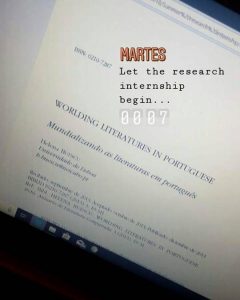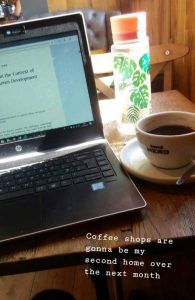Throughout the five weeks of my research internship I worked alongside Dr Emanuelle Santos to help her gain data for a book about the concept of world literature and publication in the light of globalisation and post- colonialism. Essentially, trying to establish what it takes to get a literary piece of work published. I examined world literature within the context of post- independence through transcribing an interview that Dr Santos carried out in English with Pennsylvania State University professor Djelal Kadir, who focuses on research within comparative literature, post- colonialism and Latin America; and by transcribing another interview that Dr Santos carried out in Portuguese with Cape Verdian author Evel Rocha, whose novels have been published in Cape Verde but are also available to buy in Portugal. This was with the aim of gathering data on the circulation of Luso- African works within Europe, to assess the impact of the globalisation of literature.

Going into the internship I did not really know what to expect, as an undergraduate student I feel like you have a very unclear perspective of what research entails. I was not sure how much ‘heavy research’ and reading I would be carrying out and how much I would ‘just be helping’. Listening to and transcribing the interview with Djelal Kadir in English and having weekly meetings with my supervisor to establish my progress and clarify some of the ideas behind the project, enabled me to fully grasp the concept of world literature. It also helped me further develop my own critical opinions of what world literature means in a global context and what we can hope to achieve by analysing world literature and how it is published. I ended up carrying out a lot more work with the Portuguese language than I initially thought I would, in terms of transcribing and then also translating interviews. Therefore, I would say that the improvement of my Portuguese language skills was the main thing I gained out of the internship. However, I underestimated the extent to which having to intently listen to what was being said in the interviews, multiple times, and then beginning to translate one into English, would simultaneously improve my language knowledge and my understanding of key theoretical concepts involved with the ideas behind world literature and post- colonialism. It also made me realise the difficulty of trying to get a work published in such a competitive and monopolised industry. As a Modern Languages student, it reminded me of the importance of immersing yourself in the cultural aspects of your target languages in order to excel in improving your language skills and gaining fluency.
After having studied a module on Literature in Angola and Mozambique and a module on African Studies whilst on my semester abroad at the University of Coimbra in Portugal, this gave me a basis for understanding attitudes towards post- colonialism in Lusophone Africa, but also attitudes towards Luso- African independence in Portugal. My research project allowed me to further develop my own critical ideas by enabling me to grasp the concept of world literature and changing the way I see post- colonial theory and how it should be tackled when being explored in an academic setting. It reminded me that you must be careful with asserting your own knowledge of a country’s history and culture and applying it as theory, when you cannot necessarily speak for the people who actually live within that nation. There is always more research that can be done, there are always more theories that can be adapted and there are always more attitudes that can be changed.
 I would say that the project changed the way I look at research as it made me realise that the way in which academics carry out research is constantly changing, there is no set way that things are done. The responsibilities I had could simply be considered as transcribing and translating, but when you view them within the context of the writing of an academic book, it makes you realise just how many different people, opinions and perspectives contribute to just one project. It made me realise that the work I was carrying out was still research. It also gave me an insight into the ever-changing day to day schedule you face as an academic; how flexible your job can be, but also how busy and all-encompassing it can be, giving me even more respect for any member of staff who has ever taught me at university.
I would say that the project changed the way I look at research as it made me realise that the way in which academics carry out research is constantly changing, there is no set way that things are done. The responsibilities I had could simply be considered as transcribing and translating, but when you view them within the context of the writing of an academic book, it makes you realise just how many different people, opinions and perspectives contribute to just one project. It made me realise that the work I was carrying out was still research. It also gave me an insight into the ever-changing day to day schedule you face as an academic; how flexible your job can be, but also how busy and all-encompassing it can be, giving me even more respect for any member of staff who has ever taught me at university.
Before the internship I was considering a research Masters that would link to my project. The scholarship has not only made me sure that I want to pursue this avenue, but it has pushed me towards changing my dissertation topic to one within the Portuguese department that will explore Portuguese- speaking Africa. Working in a research environment in such an intense way has fully made me realise the passion I have for my subject and has made the prospect of writing my dissertation for my fourth year a less daunting one, giving me confidence in my writing ability and the methods I use in order to find the necessary sources. I will always be grateful to Dr Santos for giving me the opportunity to carry out this internship and I am so thankful for all the advice and knowledge she has shared with me over the last five weeks.
Natalie Connor, BA Modern Languages
